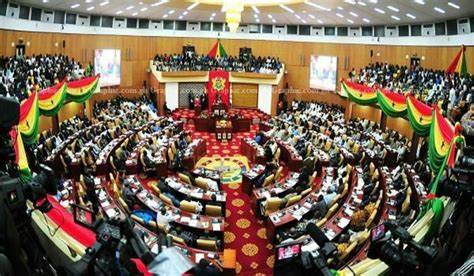In October 2024, a significant political development
occurred in Ghana’s Parliament when Speaker Alban Bagbin declared four
parliamentary seats vacant. This announcement has generated intense political
debate, with implications for the balance of power ahead of the crucial 2024
general elections.

The Declared
Vacancies and Their Context
The seats in question became vacant following the
expiration of the deadlines for the affected Members of Parliament (MPs) to
address certain legal and procedural issues tied to their eligibility. The
Speaker's decision was based on non-compliance with parliamentary regulations
regarding continuous absence or legal infractions that compromised the MPs'
legitimacy to hold office.
Declaring these seats vacant is a significant move
as it reshapes the parliamentary majority, effectively giving the opposition
National Democratic Congress (NDC) control of more seats. With these vacancies,
the NDC and the ruling New Patriotic Party (NPP) are now in a closer contest
for majority influence in the legislature.
This decision has triggered intense reactions,
particularly from the NPP, whose members argue that the Speaker’s ruling is
politically motivated and designed to undermine their parliamentary strength as
they head into the 2024 elections. On the other hand, the NDC has welcomed the
decision, viewing it as a just application of the law and a reflection of their
growing influence in Parliament.
Political
Ramifications
The declaration of vacant seats could significantly
impact the political landscape as Ghana prepares for its next general
elections. Losing parliamentary seats weakens the NPP's ability to push its
legislative agenda and could make it harder to pass critical bills. It also
reduces the party's leverage in high-stakes political negotiations.
For the NDC, gaining these vacant seats—if filled by
their candidates—would bolster their position heading into the 2024 elections.
It would give them the upper hand in Parliament, allowing them to exert more
influence over national policy and decision-making.
By-elections will likely be called to fill these
vacant seats, and both parties are expected to mobilize heavily to secure them.
The outcomes of these by-elections will be a key indicator of public sentiment ahead
of the 2024 elections, potentially influencing national momentum and party
strategies.

Legal and
Procedural Considerations
The declaration of these seats as vacant is not
without controversy. Some legal experts and political commentators have
questioned the grounds for the Speaker’s decision, suggesting that it may have
been influenced by political considerations. The affected MPs are reportedly
exploring legal avenues to challenge the Speaker’s ruling, which could lead to
a protracted legal battle. The courts may have to determine whether the Speaker
acted within his powers and whether the reasons for declaring the seats vacant
were legally sound.
In the meantime, the Speaker’s decision stands, and
the affected constituencies are preparing for by-elections. These elections
will not only fill the vacant seats but also serve as a bellwether for the
national mood as the country heads towards its next major electoral cycle.
Public
Reaction and Political Commentary
Public reactions to the declaration have been
divided along party lines. NPP supporters view the move as an orchestrated
attempt to weaken their party’s standing, while NDC supporters see it as a
rightful enforcement of parliamentary rules. The general public, however, is focused
on the broader implications for governance and political accountability. Some
Ghanaians are concerned that this kind of political maneuvering could distract
from more pressing national issues like economic recovery, job creation, and
infrastructure development.
Political analysts have also weighed in, with some
arguing that the Speaker’s move could shift the focus of the 2024 elections
from national issues to parliamentary control. Others suggest that the
declaration may embolden the NDC and could lead to more assertive political
campaigns aimed at consolidating power in both the executive and legislative
branches.

Conclusion
The declaration of four parliamentary seats as
vacant has triggered political, legal, and public reactions that will influence
Ghana’s political trajectory leading up to the 2024 general elections. The move
has not only reshaped the parliamentary landscape but also highlighted the high
stakes involved in Ghana’s democratic processes. The upcoming by-elections to
fill these seats will be crucial in determining whether the NPP can regain its
majority or if the NDC will capitalize on this shift to strengthen its
legislative position and gain for the next election.




No comments yet
Be the first to share your thoughts!